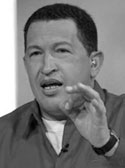
- Venezuelan president stands tall for the Black and Brown
- Poor stand with Venezuela’s president, despite country’s hardships
- Latin America, Looking Backward (BlackElectorate.com)
- ‘Proof of US involvement in Venezuela Coup Attempt’ BBC News
CARACAS, Venezuela (IPS)–Who said that raised fists at a political rally were out of style?
Representatives from the whole spectrum of the Latin American left gathered in Venezuela recently to mark the one-year anniversary of President Hugo Ch‡vez’s return to power after being overthrown by a short-lived coup.
A “red sea” of tens of thousands of “Chavistas,” who wore their trademark red berets, formed on the central Bol’var Avenue in Caracas to cheer on their leader and president.
Amidst the Venezuelan flags were some Cuban banners, posters of South American independence hero Sim–n Bol’var and portraits of Argentine guerrilla leader Ernesto Che Guevara, icon of the world left.
Alongside Pres. Ch‡vez at the rally were Cuban Vice President Carlos Lage, former Nicaraguan president and Sandinista leader Daniel Ortega, and El Salvador’s Shafik Handal, leader of the guerrilla movement-turned political party Farabundo Mart’ National Liberation movement (FMLN).
“The time has come for a new continental wave of independence. We have no alternative but to unite in struggle. This is the globalization of the revolution,” Pres. Ch‡vez told the crowd.
He asserted that the coup against him on April 11, 2002, “had and continues to bear the stamp of imperialism. It was cooked up outside the borders of Venezuela.” Mr. Chavez was returned to power on April 13, 2002, by his civilian and military supporters after the 48-hour coup led by business leaders with the approval of the United States.
The president slammed the “reactionary oligarchy” of Venezuela that preceded him in power, the “savage neo-liberalism” of the Free Trade Area of the Americas, and the International Monetary Fund, and declared “Venezuela is not for sale.”
Also present were Evo Morales, Bolivian indigenous and coca farmer leader; Ecuador’s Blanca Chascoso of the Confederation of Indigenous Nationalities; Chilean communist leader Gladys Mar’n; Colombia’s Gloria Gait‡n, daughter of assassinated politician Jorge EliŽcer Gait‡n; and Argentine activist Hebe de Bonafini, of the Mothers of Plaza de Mayo.
The street rally marked the end of a series of seminars that drew figures from the left and the anti-globalization international movement, among them former French socialist minister Jean-Pierre ChŽvŽnement, Spanish Euro-parliamentarian Pedro Marset, and U.S. activist Margaret Prescott of Global Women Strike.
And there were prominent Marxists, including Chilean resident of Cuba Marta Harnecker, the filmmakers Tarik Ali (Pakistani-British), Alex Cox (British) and Fernando Solanas (Argentine), and sociologists, such as James Petras of the United States.
Journalists also made their presence felt, with Argentina’s Stella Calloni, Italy’s Luciana Castellina, Briton Richard Gott and Spaniard Ignacio Ramonet, editor of Le Monde Diplomatique, participating in the events.
The foreign visitors shared panel discussions with leaders of the Venezuelan political parties that support Pres. Ch‡vez, like the Fifth Republic Movement and Fatherland for All, and with military officials who played key roles in the “counter-coup” that put Mr. Ch‡vez back in power, including Gen. Jorge Garc’a Carneiro, then head of the Caracas regiment and now commander of the army.
In between the various events, groups of the foreign guests met with residents of the poor districts of western Caracas, where organizations like the Tupamaros are camped, sympathizers of the president that have emerged from older radical leftist groups.
Cuban Vice-President Lage said in his speech, “There are sectors of the opposition that are afraid that the Venezuelan revolution is going to be ‘Cubanized.’ They can relax. The real danger is that the Cuban revolution will ‘Venezuelanize.’”
“All of our solidarity is with the suffering people of Iraq, with the children, men and women, innocent victims of the bombings,” stated Pres. Ch‡vez.
Salvadoran Handal commented that there is “no single path for revolution. The lesson of Venezuela is that it has opened the political-electoral route.”
American activist Prescott told the gathering, “The people of the United States are with you. Ch‡vez has marked a milestone.”
In 1992, Mr. Ch‡vez, as a lieutenant-colonel paratrooper, led a failed coup, for which he spent two years in prison. Later, he turned to electoral politics and won the presidency in December 1998.
The next year, he pushed for a new Constitution, which was ultimately approved by a plebiscite, and in the new institutional system he was elected in 2000 to govern the country until 2006.












